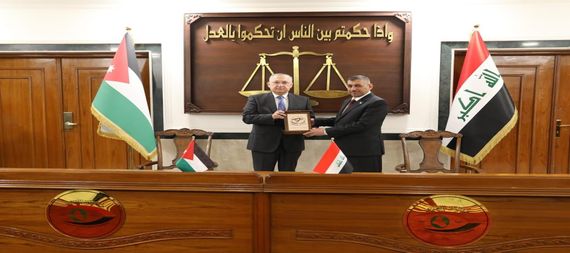Baghdad/Nina/The head of the Federal Integrity Commission, Haider Hanoun, called on all countries of the world, especially the countries party to the UN and Arab anti-corruption conventions, to join hands, cooperate and combine their efforts. In order to reduce the threat of corruption and reduce its paths after this phenomenon has become transnational, pointing to the dangers of the scourge of corruption on reconstruction, investment, development, education and health sectors.
During his speech at the ceremony for the Integrity Commission to conclude a memorandum of understanding with the Jordanian Integrity and Anti-Corruption Commission in the field of preventing and combating corruption, he stressed the importance of besieging the scourge of corruption, prosecuting its perpetrators, and not relenting in prosecuting them and pursuing the proceeds of corruption that they reaped and smuggled abroad, noting keeping up with modern methods of combating corruption in the world. And trying to benefit from it, pointing out the importance of awareness and educational programs in preventing and preventing corruption, along with the investigative and injunctive field.
Hanoun added that the Integrity Commission in the Republic of Iraq believes that combating corruption should be through an integrated and comprehensive national system in which all official and societal activities participate, warning that this phenomenon is not rooted in our society and we need to awaken consciences and spread the ethics and values of integrity to achieve significant results in curbing it. Socially, pointing to the Commission’s focus on educational curricula and their inclusion of these values, and the preparation of value guides for integrity from kindergarten to the university level, noting the launch of the Iraqi Anti-Corruption Academy to study the higher diploma in fields related to combating corruption.
For his part, the head of the Jordanian Integrity and Anti-Corruption Commission, Muhannad Hijazi, described the relationship between the Republic of Iraq and the Hashemite Kingdom of Jordan as a strong fraternal relationship that comes within the framework of the Kingdom’s vision of Iraq as its strategic depth, pointing out that the leadership in the Kingdom strongly supports the Iraqi government in all fields, whether political or Economy, indicating the importance of coordination and cooperation in the field of combating and preventing corruption, noting the necessity of adopting educational methods. To consolidate the values of integrity, combating corruption, and the sanctity of public funds among society, and to combat some clan and tribal customs and traditions that fall within the category of societal causes of corruption.
The statement indicated, “The memorandum, which was signed on behalf of the Republic of Iraq by the Chairman of the Federal Integrity Commission, Judge Haider Hanoun, and on behalf of the Hashemite Kingdom of Jordan, by the Chairman of the Integrity and Anti-Corruption Commission, Muhannad Hijazi, aims to identify areas of cooperation and coordination between the two parties in the field of preventing and combating corruption by studying its factors and situations.” Encouraging its practice, measurement, and evaluation of its risks and the most appropriate ways to combat it, in accordance with the principles and objectives specified in both the UN and Arab anti-corruption conventions.
The statement explained, “The memorandum included areas of developing mechanisms to recover funds and defendants, cooperation between the two parties in the field of specialized training courses, exchanging experts, enhancing the capabilities and skills of employees in the two bodies, academic studies and research related to corruption practices and financial crimes, preventing and combating corruption, and recovering stolen funds, as well as… Exchanging successful and best practices and approved approaches that have proven effective in the legislative and practical fields.
The statement added, “The Jordanian delegation, to learn about the formations of the Commission, its various departments, the nature of its tasks, and the nature of its work, visited the headquarters of the Iraqi Anti-Corruption Academy and toured its corridors and training halls, while the Director General of the Academy, Mazhar Turki Abd, explained the nature of its work to the Jordanian delegation, stressing that it seeks to provide training, Ensuring continuous education to qualify the cadres of the supervisory authorities, spreading the culture of integrity, transparency, accountability and accountability, developing capabilities and skills, and creating an innovative training and educational system based on the needs of the supervisory authorities, and contributing to reducing the phenomenon of corruption, along with a number of other tasks assigned to the Iraqi Anti-Corruption Academy. Then the delegation moved To the Department of Education and Public Relations, where the Director-General of the Department explained the nature of its work by doing what is necessary and appropriate to develop a culture of integrity, uprightness, transparency, submission to accountability, spreading fair dealing, and respect for the law through preparing educational curricula to promote ethical behavior in the field of public service, issuing magazines and preparing value guides. For integrity.
The Jordanian delegation concluded a tour by visiting the Investigations Department and learning about its formations and tasks, where the Director-General of the Investigations Department, Raed Fadel Dahmush, explained the nature of his department’s work, indicating that it undertakes the duties of investigating and investigating corruption cases in coordination with the competent regulatory authorities and under the supervision of the judiciary in accordance with the provisions of the amended Federal Integrity Commission law. And Criminal Procedure Law No. (23 of 1970) and Penal Code No. (111 of 1969) as amended, and it consists of the headquarters of the Investigation Department and the investigation directorates and offices in the governorates./End p.

To receive more news, subscribe to our channel on Telegram


